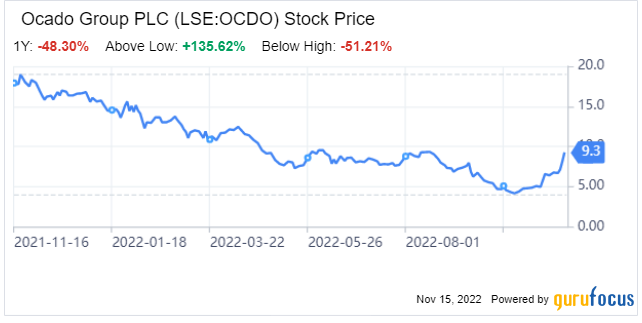The great economist and investor John Maynard Keynes once said, “When the facts change, I change my mind." Well, I’m changing my mind about Ocado Group PLC (LSE:OCDO, Financial). In October last year, I wrote positively about the stock, but now I believe the environment has changed significantly, and due to this, my old investment thesis must also be thrown out.
Ocado is a U.K.-based technology company that provides end-to-end online grocery fulfilment solutions through the Ocado Smart Platform to some of the world’s largest grocery retailers. It holds a 50% share of Ocado Retail Ltd in the U.K. in a joint venture with Marks & Spencer (LSE:MKS, Financial). The Ocado Smart Platform comprises access to Ocado's physical infrastructure solutions, running highly efficient warehouse operations for the single pick of products, together with the entire end-to-end proprietary software applications required to operate a world class online grocery business. This is underpinned by Ocado's proven expertise and experience as a dedicated online grocer in the U.K., with over two decades spent innovating for online grocery.
This growth stock did benefit from the era of low interest rates. The stock is classified by the FTSE in the Food Retailers and Wholesalers subsector, the same as traditional and more profitable retailers like Tesco (LSE:TSCO, Financial) and Sainsbury (LSE:SBRY), which will be more attractive to fund managers in a higher interest rate environment. But let’s look into the progress of Ocado in recent times to see why I no longer believe in this stock's growth potential.
Unattractive changes
The company has been investing heavily into building online fulfilment capacity for third-party retailers and its own joint venture with Marks & Spencer. The payback will only be reached when those facilities get to sufficient scale and generate enough cash to counter the cost of signing new commercial partners.
Moreover, while executing these ambitions, Ocado’s financial strength has weakened. Both its Piotroski F-Score of 4 out of 9 and its Altman Z-Score of 2.46 are lower than when I wrote about the company last year.
Ocado’s agreement to build fulfilment centres for Lotte Corp (XKRX:004990, Financial), a South Korean retail conglomerate, boosted its stock price almost 40% in one day at the start of this month. This was the biggest daily rise recorded since Ocado signed its first big international partnership with Kroger (KR, Financial), an American grocer, in 2018. The Lotte deal is smaller as Ocado will build six fulfilment centres for the company by 2028, much less than the 20 agreed for Kroger, but it is still a significant boost.
Hard to justify the lack of profitability
I believe it is hard for Ocado to justify the heavy losses associated with fitting out the customer fulfilment centres. Funding for the construction of warehouse buildings comes from clients, but the cost of the software and automation technology falls primarily by Ocado. Ocado’s solutions business charges clients an upfront fee and a continuing fee based upon delivered sales capacity, but with a GuruFocus profitability rank of just 4 out of 10, it’s safe to say Ocado isn’t generating enough cash to attract investors.
The natural lag between funding the fitting of facilities and the associated revenue capacity reaching maximum potential continues to negatively impact Ocado’s profits. These facilities start making money for the group only after three years of being operational. With the exception of 2020, distribution and administration expenses have grown faster than revenue growth over each of the past five years. In a low interest rate environment, we could perhaps ignore this. Now we can’t.
This year, the company's adjusted Ebitda is expected to be just under 80 million British pounds ($95 million) which will be far outweighed by losses of about £117 million from the international unit. Analyst rtimates don’t see any positive earnings per share numbers this year, or for the next three years.
All this means there is more risk of equity dilution to raise cash to fund its expansion. A £578 million equity-raising and securing a £300 million credit facility gave the group access to almost £2 billion in cash and undrawn debt facilities this past July. Management says this gives it enough capital to fund the building of the fulfilment facilities it has already committed to, along with new projects that might be in the pipeline. That may be so, but the company badly timed its last equity-raising to the detriment of shareholders.
Valuation
The company's GF Score of 69 indicates poor future potential, driven by low profitability and financial strength as well as a low GF Value rank (there was not enough data to compute the momentum rank).
The GF Value chart labels the stock as a potential value trap:
Management has been unable to give solid guidance on when it can make any non-adjusted profits in the near term, so scepticism towards Ocado is warranted in my view. There are less risky growth bets to be made in the current market, and there are financially stronger, more profitable plays even within the U.K. Consumer Staples industry.



